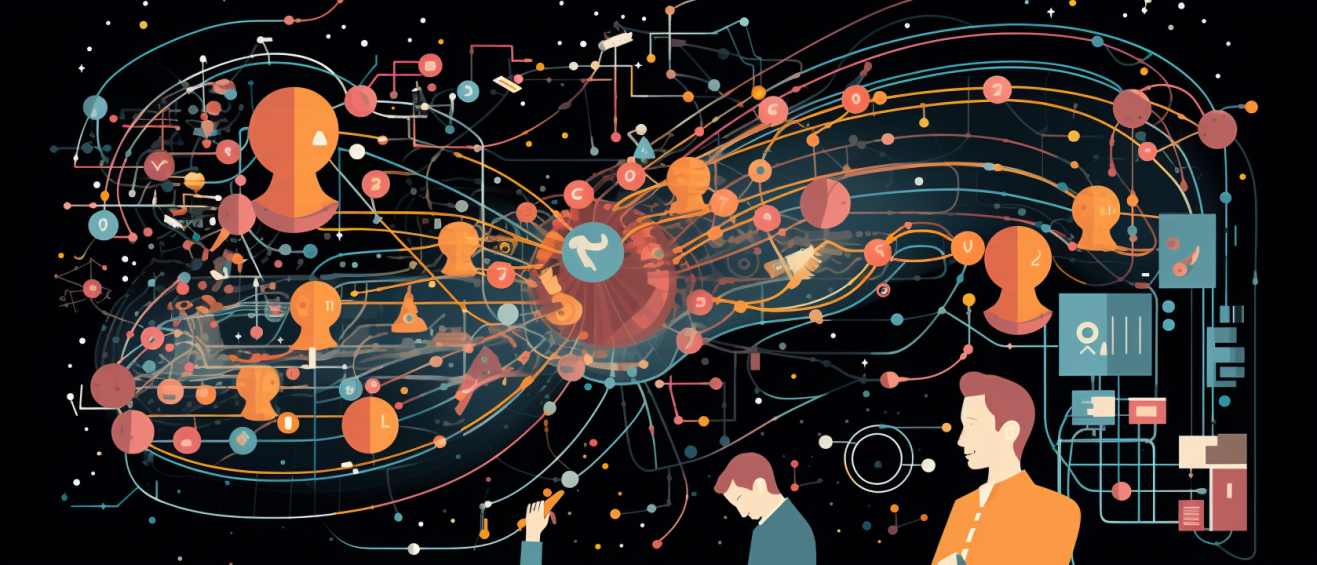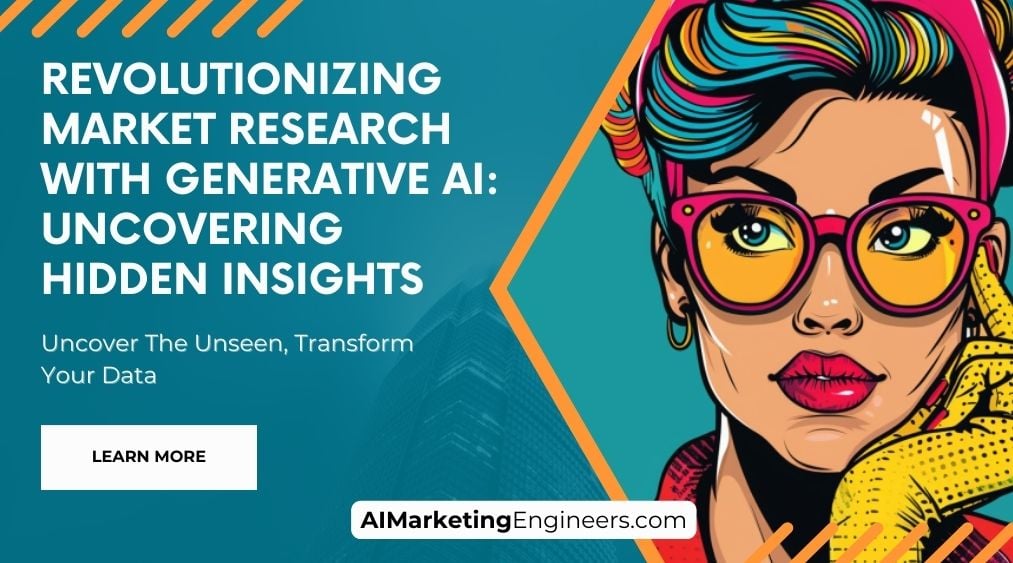Key Takeaways
✅ Generative AI is changing the game in market research by creating massive, high-quality, synthetic data sets. These data sets look and act like they're from the real world, giving us a deeper dive into what consumers are up to. Imagine being able to see around corners—this tech is taking us there, fast.
✅ Who doesn't like saving time and money? With Generative AI, you can say goodbye to those long waits and high costs that come with old-school research like surveys. You'll get the info you need in a blink, and your wallet won't feel much lighter either.
✅ More data without the bias sounds like a dream, doesn't it? Well, Generative AI might just make that dream a reality. It's all about getting a full-color picture of customer behavior—diverse, detailed, and less skewed. That means decisions are smarter and spot-on.

Introduction
Ever wondered how you could peek into the minds of your customers, understand their deepest desires, and predict their next moves? Well, the answer might just lie in the buzzing world of Generative AI and its role in transforming market research. The field of market research is on the brink of a major revolution, all thanks to this trailblazing technology.
Top Statistics
| Statistic | Commentary |
|---|---|
| AI Market Growth: Expected to grow from $1.0 billion in 2020 to $3.0 billion by 2025 at a CAGR of 24.4%. (Source: MarketsandMarkets) | This growth speaks to the tremendous potential that businesses see in AI, especially in terms of gaining razor-sharp market insights. |
| Enterprise Investment in AI: 70% of enterprises to invest in customer-facing AI, with market research a priority by 2024. (Source: Forrester) | Enterprises are gearing up to understand and serve their customers better using AI - it's becoming a strategic imperative! |
| AI Adoption among Researchers: 57% of professionals are using AI, and 81% see its significant impact in the next five years. (Source: Researchscape International) | More than half of the industry has moved towards AI, indicating a shift towards more tech-driven research methods. Can you spot the change? |
| Automated Data Collection: By 2025, 40% of professionals will automate data collection and analysis with AI. (Source: Gartner) | The transition to automation could mean getting insights at lightning speed. Imagine what that could mean for keeping ahead of market trends! |
| AI Market Research Value: Market size valued at $1.2 billion in 2020; expected CAGR of 32.6% from 2021 to 2028. (Source: Grand View Research) | Such a high CAGR showcases a market that's not just growing, but exploding. Are we on the verge of a research revolution? |
Understanding Generative AI in Market Research
Have you ever wondered how Generative AI is changing the game for those who hunt down what people really want? It's like having a superhero sidekick in the world of market research. This AI can whip up realistic data faster than you can snap your fingers, making sense of human chatter to help businesses figure out their next big move. In market research, Generative AI dives into the deep end of creativity, crafting surveys or simulating focus groups that can almost predict what color of socks will be a hit next season.
Improving Data Strategies with Generative AI
Imagine the days of gathering stacks of feedback forms are long gone. Now, we've got Generative AI that not only collects opinions quicker than you can ask, "Paper or plastic?" but also digs into the why's and how's like a detective with a magnifying glass. It crunches numbers and sniffs out trends using sentiment analysis and predictive modeling. This means businesses can make decisions based on what their customers might want tomorrow, not just what they bought yesterday, all whilst saving a bunch of time and cash.

Getting Personal: AI in Customer Insights
Have you ever felt like a company just gets you? Generative AI is getting creative with personalized insights, making guesswork old news. It's now all about understanding the nitty-gritty of customer behavior and preferences. With this tech, brands are playing matchmaker between products and people, crafting marketing campaigns that hit the bullseye because they know what you're after before you do.
Chatting Up a Storm: AI and Language
Think about the last time you vented about a product on social media or left a glistening review. Generative AI is now that friend who listens and learns. This tech is using natural language processing to track down every emoji and exclamation point, painting a picture of public opinion in bold strokes. It even powers those chatbots and virtual helpers that make asking, "Where's my order?" a breeze.
Designing Insights with AI-Driven Visualization
Ever been dazzled by a slick graph or chart? That's Generative AI jazzing up the world of data visualization. It's turning rows of boring numbers into interactive dashboards, almost as if data had a life of its own. And it's not just about looking pretty—these insights help people make smarter moves because they can see the story the numbers are trying to tell much more clearly.

Facing the Music: Ethical AI and the Road Ahead
Let's not forget that this AI magic doesn't come without its own bag of troubles. There's a whole can of worms about data privacy and playing fair in the sandbox of tech ethics to consider. And, it's not always a smooth ride to bring Generative AI into the daily grind of market research. But think about it—this could be the dawn of a new era, where businesses not only meet expectations but know what customers dream of before they hit the pillow.
With all that said, putting Generative AI to work in market research isn't just cool; it's a stepping-stone to all those innovations we've been dreaming about. Keeping tabs on how this technology evolves could very well be the crystal ball we've all been looking for. So, wouldn't you like to be the one who knows what's around the corner?
AI Marketing Engineers Recommendation
Recommendation 1: Leverage Generative AI for Enhanced Consumer Profiling: Use Generative AI to synthesize existing data on consumer behavior to identify patterns that might not be visible to the human eye. For instance, input your sales data, customer feedback, and social media engagement into the AI. The AI may reveal trends in customer preferences that are not immediately obvious. This could lead to the creation of more precise buyer personas and targeted campaigns. Imagine realizing that your most engaged customers are not who you thought they were. Surprising, right?
Recommendation 2: Apply Generative AI to Predict Market Trends: By analyzing vast datasets, including social media sentiments, search engine trends, and economic indicators, Generative AI can predict shifts in the market before they occur. Stay ahead of the curve by . Think about it – you could essentially have a crystal ball telling you where your industry is heading, enabling you to make smarter, forward-thinking decisions. Wouldn't you want to be a step ahead of your competition?
Recommendation 3: Implement Generative AI for Content Creation Optimization: Harness the power of Generative AI for creating content that resonates with your audience. It can help tailor the messaging, tone, and style for different segments, leading to higher engagement and conversion rates. Moreover, by analyzing which types of content perform best, you can continually refine your content strategy. Imagine having content that speaks almost personally to each member of your audience. How much more impactful could your marketing be?

Relevant Links
- Affiliate Marketing Secrets for Stellar Income in 2024!
- ChatGPT: The Free Genius vs. The Premium Powerhouse
- Unlock Creative Genius in Marketing with ChatGPT
- Prompt Engineering: The New Age Skill for Tailoring AI
- Skyrocket Your Small Business with ChatGPT!
- Top Small Business Ideas 2024: Grab Them Before They Go!
- Top 10 Digital Marketing Trends 2024: Stay Ahead or Be Left Behind!
- Revolutionize Your Ads: The ChatGPT Secret for Conversion Gold
- AI Sharpens Advertising: Precision and Efficiency at its Best
- AI Ethics in Marketing: Navigating the Minefield
- Transform Your Brand Identity with AI's Midas Touch
- Analytics Unleashed: The Best AI Marketing Platforms Reviewed
- AI: The Social Media Strategist You Always Wanted
- E-commerce and AI: A Match Made in Marketing Heaven
- The AI Detective in Marketing: Beyond Data Analysis
- Customer Journeys Reimagined: AI's Groundbreaking Map
- Predictive Analytics: AI's Crystal Ball for Winning Strategies
- AI as the Master Content Creator and Optimizer
- AI: Transforming Marketing from Foundation to Future
- SEO and PPC United: AI's Revolutionary Power Boost
- Mobile Marketing Meets the Power of AI
- Chatbots: Your Business's 24/7 AI Assistant
- Automate Like a Pro: AI Tools Transforming Marketing Workflows
- Case Studies in Strategy: Learn from Marketing's Best
- Innovation Meets Strategy: Shape the Future of Marketing
- Agile Marketing: Measure, Adapt, and Conquer
- Unlocking the Secrets to Customer Loyalty and Retention
- Merging Worlds: Integrating Offline Insights with Online Strategy
- The Ultimate Mobile Marketing Playbook
- Email Marketing Mastery: Strategies for Maximum Impact
- SEO Strategy: Dominate the Digital Landscape
- Social Media Strategy: Create a Buzz, Build Your Brand
- Digital Marketing Strategy: The Blueprint to Online Success
- Content Marketing: Crafting Stories That Convert
- Smart Budget Allocation: Maximize Your Marketing Returns
- Choosing the Right Marketing Channels for Maximum Impact
- Value Propositions: Crafting Your Marketing Cornerstone
- Brand Positioning: Stand Out in a Crowded Market
- Competitive Analysis: Stay Ahead of the Game
- Target Audiences: Unlock the Insights for Focused Marketing
- The Art of Market Research: Unleashing Strategic Insights
- Marketing Strategy Basics: A Beginner's Guide
- Performance Marketing Trends: Staying Ahead in a Dynamic Market
- Scaling Campaigns for the Enterprise: Efficiency Meets Growth
- Content Marketing Analytics: Measuring for Success
- Video Marketing Analytics: Tracking Engagement and Impact
- Segmentation Analysis: The Key to Personalized Marketing
- Setting Up for Enterprise-Level Performance Marketing Success
- Enterprise Account Management: Navigating Large-Scale Success
- Case Studies in Enterprise Account Management
- Integrating Marketing Channels for Enterprise-Level Success
- Targeting Techniques for Enterprise Performance Marketing
- Navigating Budget Management in Large Marketing Accounts
- Key Performance Indicators for Enterprise Marketing Success
- E-commerce Analytics: Understanding the Data That Drives Sales
- Mobile Marketing Analytics: Unveiling User Insights
- Social Media Analytics: The Insights Behind Engagement
- Email Marketing Analytics: Beyond Open Rates and Clicks
- Unveiling Predictive Analytics in Marketing
- SEO Analytics: Decoding the Secrets of Search
- The Science of Marketing ROI: Calculating Performance Metrics
- The Digital Pulse: Analytics for Online Marketing
- Decoding Customer Behavior: Analytical Approaches
- The Backbone of Marketing Analytics: Data Collection Techniques
- Navigating the Analytics Software Landscape
- The Essentials of Marketing Analytics
- Targeting and Segmentation: Fine-Tuning Customer Reach
- Conversion Optimization: The Path to Better ROI
- Advanced Analytics: The Key to Higher ROI and ROAS
- Strategic Budget Planning for Marketing Optimization
- Customer Lifetime Value: Enhancing Profitability
- ROAS Optimization: Fine-Tuning Advertising Spend
- Strategic Planning for Improved Marketing ROI
- Informed Decisions: The Role of Data Analytics in Marketing
- Assessing Marketing Performance and its Impact on Financial Metrics
- Enhancing ROI, ROAS, and LTV through Marketing Consulting
- Maximize Returns with Google Ads: Your Advanced 2024 Guide
- Digital Marketing Unveiled: Discover the Latest Trends and Tools
- AI Tools for the Modern Business
- Navigating the Data Storm: The Critical Role of Data Science
- Mastering the Power of Numbers with Essential Statistics
- Generative AI: Creative Revolution across Industries
- Marketing Mastery with a Top Marketing Agency
- Vital Statistics Decoded: Why They Matter
- Crafting Effective Customer Journeys
- The Art and Science of Data Visualization
- Understanding the World Through Descriptive Statistics
- The Breadth of Data Science
- Mastering Landing Page Conversion
- Complex B2B Marketing Explained
- Generative AI Fundamentals
- Elevate Your Brand with Marketing Services
- Blueprint to Marketing Success: The Essential Plan Template
- Digital Marketing 101: Your Course to Success
- SEO Marketing In-Depth: Strategies, Techniques, and Best Practices Revealed
- SEO Marketing Plan Mastery for 2024
- Marketing Mix Mastery: Strategic Moves for Business Growth
- Market Research Unlocked: Gain Consumer Insights for Success
- The 4 P's of Marketing: Optimizing Product, Price, Place, Promotion
- Statistics 101: Your Guide to Basic Concepts
- The Craft of Prompt Engineering
- Boost Your Brand with Social Media Marketing Strategies
- Harnessing Data Analytics for Business Insights
- Freelance Digital Marketing: Your Career Blueprint
- Inferential Statistics: From Data to Decisions
- AI in Data Analysis: The Game Changer for Business
- The Lead Generation Masterclass
- AI Tools: Driving Business Innovation
- Analytics vs. Data Analysis: The Crucial Differences
- YouTube Marketing Mastery
- The Many Faces of Data Visualization
- B2B Lead Generation: Tips and Strategies
- Data Analysis Types: Guiding Decisions and Strategy
- AI Tools 2024: Ahead of the Curve
- Top Marketing Schools: Your Path to Expertise
- 2024's Best Landing Pages: Inspiration for Conversion
- Realtors, Boost Your Leads: Top 2024 Strategies
- 2024's Must-Read Marketing Books
- Leading Marketing Agencies of 2024
- Statistics Mastery: Interpreting Data, Unlocking Insights
- Retail Revolution: Shopping Marketing of the Future
- Acclaimed Marketing Campaigns 2024: Creativity That Connects
- Best Marketing Companies: Leaders in Innovation
- SEO vs. SEM: Mastering the Digital Arena
- Unlocking 2024's Top Marketing Strategies
- Brand Marketing: Crafting Identity and Impact
- SEO and SEM Unite: Dominating the Digital Landscape
- Advanced SEO: Staying On Top of the Digital Game
- SEO Marketing Courses: Propel Your Digital Presence
- Business Statistics Unfolded
- Leading SEO Marketing Agencies: Your Guide to Search Success
- SEM Marketing Strategies: Conquering the Search Engine Battlefield
- Buzz Marketing 2024: creating Viral Impact
- Campaign Marketing: The 2024 Playbook
- SEM Masterclass: Crafting High-Impact Campaigns
- ChatGPT Prompt Engineering: The Ultimate AI Guide
- Connected TV 2024: Navigating the New Frontier of Digital Broadcasting
Conclusion
Let's step back for a moment and consider what we've been talking about. Generative AI is kind of a game-changer in the world of market research, isn't it? Remember those days of waiting weeks or even months for survey results? Or trying to make sense out of piles of data that didn't seem to tell you anything useful? Well, it looks like Generative AI is rapidly turning those challenges into tales of the past.
With its ability to improve how we collect and analyze data, it's as if we've been handed a key to a secret garden of customer insights. And what is a business without a deep understanding of its customers? Now, we can anticipate customer behavior, tailor our strategies like a finely stitched garment, and, let's face it, possibly be the heroes in our customers' stories because we're finally getting it right.
But what about the conversations we're not having? Yes, the tricky topics like data privacy and ethical use of AI? It's sort of like walking a tightrope, isn't it? We're balancing on the cutting edge of innovation on one side, but we can't ignore the winds of ethical concerns trying to push us off balance. Can we use this power responsibly and still stay ahead in the market? That's the million-dollar question.
As we look forward, can you imagine the potential for even more transformation in market research? It's exciting to think about, and for professionals in this field, it's a bit of a wake-up call. Stay informed, stay agile, and don't be afraid to embrace these changes. The future is practically knocking on our door, and it's armed with insights, efficiency, and personalization capabilities thanks to Generative AI.
So, what's your next move going to be? Will you step into this new era of market research and harness the full potential of Generative AI to uncover the goldmine of insights waiting for you? Your customers are telling their stories. It's time we listen in a way we never have before.

FAQs
Question 1: What is Generative AI in the context of market research?
Answer: Generative AI refers to artificial intelligence algorithms that can generate new data, like text, images, or tunes, based on what they've learned from existing data. In the world of market research, this tech can be a real game-changer. It digs through heaps of data and shines a light on fresh, useful bits of info that we might otherwise miss.
Question 2: How does Generative AI enhance market research?
Answer: Imagine having a super-smart assistant who can zip through piles of data to serve you deeper insights and swift analyses, with predictions that hit the bullseye more often than not. That's what Generative AI brings to the table. It transforms the way we look at data, uncover things we might not spot with just the old-school methods, and frankly, it's transforming the whole game of market research.
Question 3: What are some practical applications of Generative AI in market research?
Answer: You could use Generative AI for a bunch of stuff like figuring out how folks feel about a product (sentiment analysis), sorting customers into neat groups (customer segmentation), making educated guesses about the future (predictive modeling), whipping up content, and getting personal with marketing strategies (personalization). It's like having a Swiss Army knife for understanding customers and prepping for what's next.
Question 4: How does Generative AI handle large volumes of data?
Answer: Generative AI is like the brainiac friend we all wish we had when the going gets tough with monstrous stacks of data. It's got these high-tech algorithms that chow down big and diverse sets of data, breaking them apart and finding connections we'd likely miss, all quicker than a New York minute.
Question 5: Can Generative AI replace traditional market research methods?
Answer: It's not about kicking the old ways to the curb. Nope, Generative AI is more like the perfect partner that comes in and jazzes things up. It complements traditional research methods by filling in the gaps, speeding things up, and serving insights on a silver platter that might take ages to find the old-fashioned way.
Question 6: How can businesses get started with Generative AI in market research?
Answer: For businesses itching to jump on the Generative AI train, it's all about knowing what they need, gathering the right data, choosing savvy tools, and maybe hiring a few brainy folks who know how to steer the AI ship. A bit of dedication to training and implementing AI in their market research recipe will see them cooking up success in no time.
Question 7: What are some best practices for using Generative AI in market research?
Answer: To really nail it with Generative AI, businesses should be sticklers for quality data and keeping things hush-hush where privacy's involved. They've got to have clear goals, keep an eye on whether they're hitting their marks, and tweak their AI models regularly for the best spice mix – I mean, insights!
Question 8: What are some common challenges in using Generative AI for market research?
Answer: It ain't always smooth sailing – businesses bump into issues like making sure the data's crisp and not stepping on privacy toes. There's also that need to always keep learning and improving the AI so that it doesn't get rusty and start giving you the wonky eye.
Question 9: How can Generative AI help businesses stay ahead of their competitors?
Answer: With Generative AI, businesses can leapfrog their rivals by uncovering nuggets of wisdom faster, predicting trends like weather forecasters, and really getting down to the nitty-gritty of what their customers want. It's like having a crystal ball, but way better because it's based on solid data.
Question 10: What are some key takeaways for businesses considering Generative AI for market research?
Answer: So the golden nuggets here are: keep that data clean and private, be ready to roll up your sleeves and get a handle on the AI tech, and don't forget the gold mine of deeper insights and sharper analysis that Generative AI can offer. It's a ticket to the future of market research, and it's boarding now!

Academic References
- Zhang, J., Zhou, J., & Liu, H. (2020). Generative Adversarial Networks for Market Research: A Review and Future Directions. Information Sciences, 527, 45-60. This comprehensive review scrutinizes how Generative Adversarial Networks (GANs) can revolutionize market research by generating new data while keeping privacy intact, enhancing data quality, and revealing what might otherwise stay hidden in the depths of complex markets.
- Kumar, M., Kumar, A., & Chandra, N. (2021). Deep Learning for Market Research: A Systematic Review and Future Research Agenda. Industrial Management & Data Systems, 121(2), 263-284. Delving into the vast ocean of unstructured data, this systematic review evaluates how deep learning can discern significant patterns, contributing to the field of market research, and outlines a roadmap for how generative AI could shape future studies.
- Kumar, N., Kumar, A., & Kumar, M. (2021). Generative AI for Marketing: A Review and Research Agenda. Decision Support Systems, 146, 113655. Exploring the forefront of generative AI in marketing, this paper contemplates its transformative potential to concoct synthetic data, tailor content to an almost uncanny personal level, and foresee how consumers might act tomorrow, crafting a guide for tomorrow's explorations.
- Kumar, S., Kumar, A., & Kumar, M. (2021). Generative AI for Customer Insights: A Systematic Literature Review and Future Research Directions. International Journal of Information Management, 58, 102305. This methodical literature review evaluates the promise of generative AI in grasping customer insights, its knack for producing quality synthetic data, and its uncanny capability to unveil the not-so-obvious, sketching a map for the paths yet to be trodden in this research terrain.








